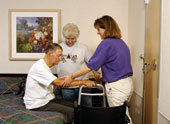Fabila de Zaldo (1999) states that; The World Health Organization calculated that in 1990 there were 500 million people with disabilities in the world, and that by the year 2000 the number would reach 600 million. According to these figures, 10 percent of the total world population suffers from some type of physical, mental, or sensory disability. This is a serious problem, especially in developing countries where the greatest numbers of individuals with disabilities are reported to live (Fabila de Zaldo, 1999, p. 2).
Fabila de Zaldo (1999) explains; the seriousness of the problem, however, is even more critical than numbers alone reflect. The majority of these people live in deplorable conditions, struggling against physical, cultural, familial, or social obstacles that prevent them from full social integration. There are millions of children, young people, adults, and elderly people in the world who, with their families, live in marginal conditions and are excluded and deprived of their rights. This problem is not limited to poor countries. Social injustice and the violation of human rights of disabled people are found both in developing and in developed nations alike. All of the above lead us to analyze, reflect, dream, and decide to fight against these circumstances with a clear vision of what we want to accomplish for our children, brothers, friends, or students. After all, this is a human rights issue (Fabila de Zaldo, 1999, pp. 2-5). Fabila de Zaldo (1999) also explains that; Regardless of age, any person with disabilities affects his/her family. By the year 2000, more than 2.4 billion inhabitants of the world will be confronted with this problem unless we develop strategies to prevent some disabilities and minimize discriminatory conditions, abuses, social injustice, and the marginalization suffered by people with disabilities. Support systems must be created within societies to improve the quality of life for individuals with disabilities and their families. Finding global solutions to this problem must be viewed as a priority, as well as individual solutions in the different countries and even in different regions of the same country (Fabila de Zaldo, 1999, pp. 5-6).
Rebick (2005) explains; In the case of disabled people, there is a wide range of social problems associated with disadvantaged conditions. Disabled individuals are a vulnerable group that often suffers social injustice, marginality, and poverty and affects millions of people and their families. For this reason society must respond appropriately and assume responsibility for the material and the spiritual needs of individuals, their families, and their communities. Social development and justice that promotes a better quality of life for all can only be achieved within a frame of peace and security, respecting human rights and fundamental liberties within a realm of human interdependence that involves all members of society (Rebick, 2005, pp. 212-218).

Leave a comment